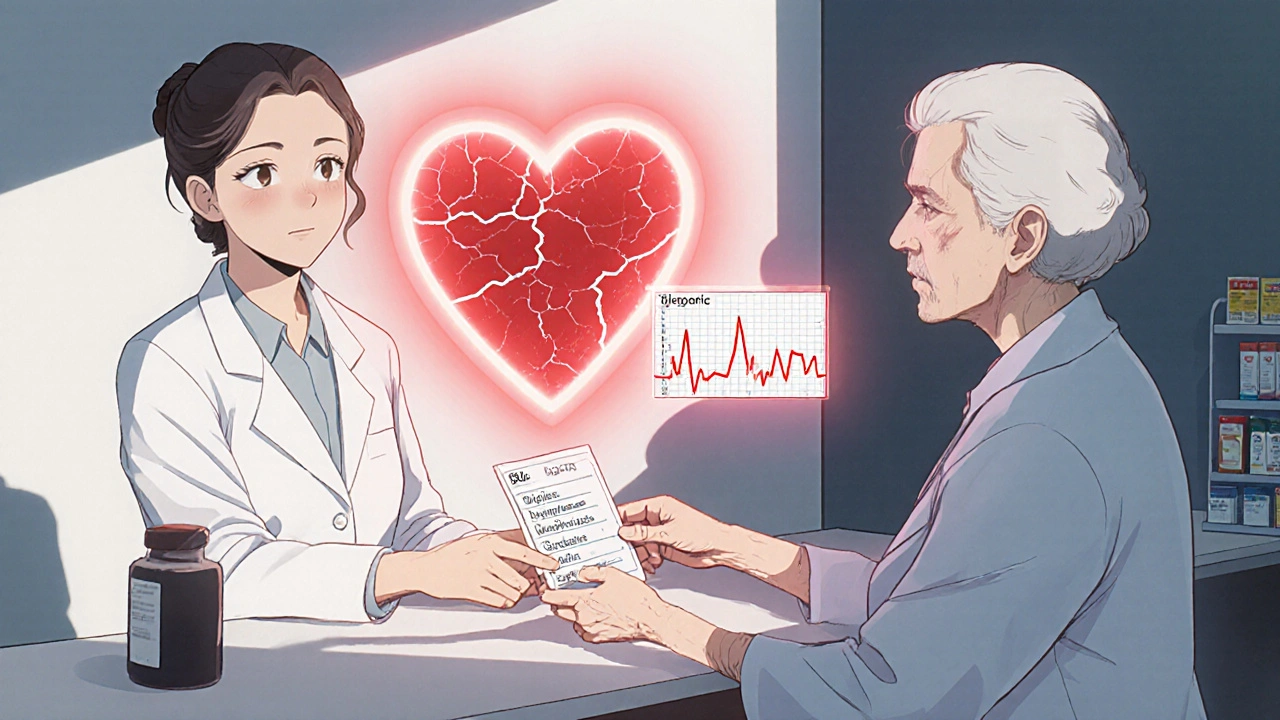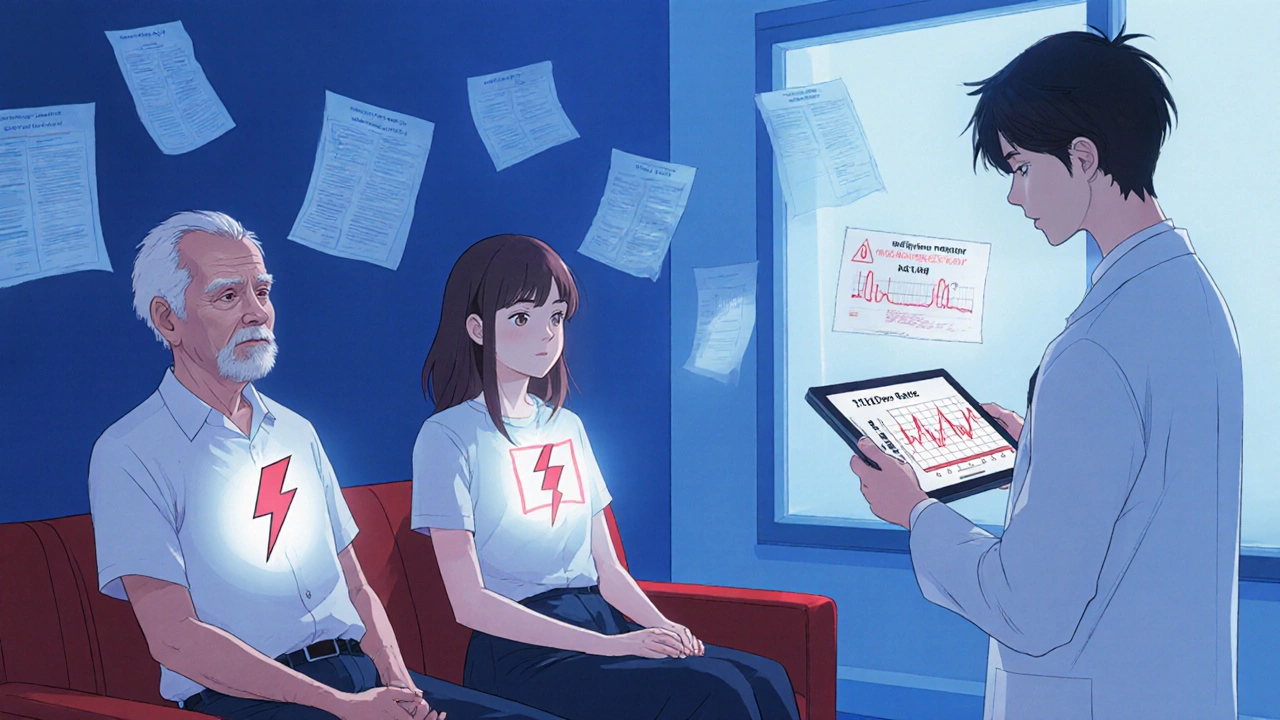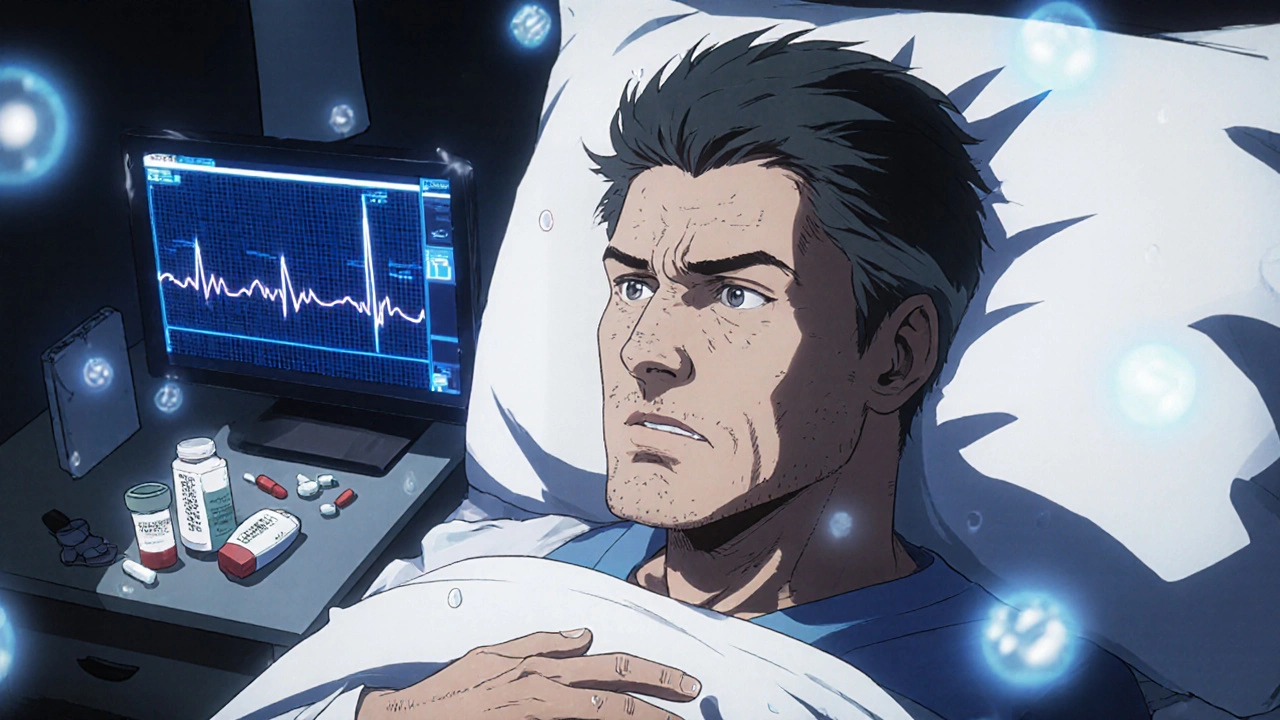Medication Arrhythmia Risk Checker
Your Medication Risk Assessment
This tool helps you understand how your medications might affect your heart rhythm. Based on your selections, it will calculate your risk level and provide important safety information.
More than 400 common medications can trigger dangerous heart rhythm problems - and many people have no idea they’re at risk. It’s not just the old-school drugs like quinidine anymore. Today, it’s your antibiotic, your antidepressant, your cholesterol pill, even your heart rhythm medication itself that might be quietly messing with your heartbeat. These aren’t rare side effects. They happen often enough to send over 100,000 Americans to the hospital every year. The good news? Most of these cases are preventable if you know what to watch for and what to do.
What Exactly Is a Drug-Induced Arrhythmia?
A drug-induced arrhythmia is an abnormal heart rhythm caused by a medication. Your heart beats because of electrical signals traveling through muscle tissue. Certain drugs interfere with those signals - usually by messing with tiny channels in heart cells that control the flow of potassium, sodium, or calcium. When those channels don’t work right, your heart can skip, race, or flutter in dangerous ways.
The most common and dangerous type is QT prolongation. This is when the heart takes too long to recharge between beats. On an ECG, it shows up as a longer QT interval. Left unchecked, it can spiral into torsades de pointes, a life-threatening ventricular arrhythmia that can cause sudden cardiac arrest. Over 25 medications now carry FDA black box warnings for this exact risk, and eight more got those warnings in 2022 alone.
Which Medications Are Most Likely to Cause Problems?
It’s not just one class of drugs. Arrhythmias can come from almost any category:
- Antibiotics: Macrolides like azithromycin and fluoroquinolones like levofloxacin are top culprits. Risk spikes in the first week of use.
- Antidepressants and antipsychotics: SSRIs, tricyclics, and drugs like haloperidol can delay heart repolarization. Up to 18% of arrhythmia cases link to psychiatric meds.
- Antiarrhythmics: Ironically, drugs meant to fix heart rhythms - like flecainide, propafenone, and even amiodarone - can make them worse. Flecainide can turn atrial flutter into a dangerous 1:1 conduction pattern. Amiodarone can trigger atrial fibrillation through thyroid disruption.
- Digoxin: Used for heart failure and atrial fibrillation, digoxin toxicity causes paroxysmal atrial tachycardia with block. Toxicity happens when levels go above 2 ng/mL - common in older adults with kidney issues.
- Diuretics: These can drain potassium and magnesium, two minerals your heart needs to beat properly. Low levels make arrhythmias far more likely.
- Cancer drugs: Trastuzumab (Herceptin) and others cause inflammation and oxidative stress that damage heart cell channels, leading to atrial fibrillation in 2-5% of users.
Here’s the scary part: it’s not just one drug. When you take two or more QT-prolonging medications together, your risk jumps 300-500%. That’s why someone on an antidepressant plus an antibiotic plus a diuretic is in serious danger - even if each drug alone is considered safe.
What Are the Warning Signs You Can’t Ignore?
Most people don’t feel anything until it’s too late. But if you’re on any high-risk medication, pay attention to these red flags:
- Palpitations: Feeling your heart race, pound, or flutter. Reported by 70-80% of patients with drug-induced arrhythmias.
- Dizziness or lightheadedness: Especially if it happens suddenly or with standing. Affects 40-50% of cases.
- Fatigue or weakness: Not just being tired - feeling like you can’t get out of bed despite sleeping enough. Seen in 30-40%.
- Chest discomfort: Not always a heart attack. Could be a skipped beat or extra beat pressing on nerves. Present in 15-20%.
- Fainting or near-fainting: Syncope is a major red flag. Happens in 5-10% of cases and often signals a serious rhythm problem.
Don’t brush off dizziness as ‘just getting old.’ Don’t assume palpitations are ‘just anxiety.’ If you’re on a medication known to affect heart rhythm and you feel any of these, it’s not normal. It’s your body warning you.

Who’s at Highest Risk?
Not everyone reacts the same. Three big risk factors make arrhythmias much more likely:
- Age 65 and older: Sixty to seventy percent of severe cases involve seniors. Kidneys slow down, electrolytes get out of balance, and meds stick around longer.
- Low potassium or magnesium: Hypokalemia (low potassium) affects 20% of hospitalized patients. Hypomagnesemia (low magnesium) hits 10-15%. Both are common with diuretics, vomiting, or poor diet.
- Heavy alcohol use: More than three drinks a day triples your risk. Alcohol directly irritates heart tissue and lowers magnesium.
There’s also a genetic layer. About 15% of people of African ancestry carry the S1103Y variant, and 12% of East Asians carry R1193Q. These genes make heart cells extra sensitive to QT-prolonging drugs. Right now, testing isn’t routine - but research shows that screening could prevent up to 70% of severe cases. Labs are already using CRISPR-edited heart cells to predict who’s vulnerable. This isn’t science fiction - it’s coming to clinics soon.
How Are These Arrhythmias Managed?
Most cases can be fixed without surgery - if caught early.
- Stop or switch the drug: In 75-85% of cases, simply discontinuing or changing the medication resolves the issue. For example, switching from azithromycin to amoxicillin cuts QT risk dramatically.
- Correct electrolytes: If potassium is below 4.0 mEq/L or magnesium below 2.0 mg/dL, IV or oral replacement is critical. Don’t wait for symptoms to worsen.
- Monitor with ECG: Before starting high-risk meds, get a baseline ECG. Repeat within 72 hours. If QT interval increases by more than 60 milliseconds from baseline, the drug should be stopped.
- Adjust beta-blockers carefully: If metoprolol causes bradycardia (slow heart rate), 60-70% of patients improve with a lower dose. For some with atrial fibrillation who still need rate control, a pacemaker may be needed to safely keep the drug.
- Use alternatives: For depression, consider sertraline over citalopram. For infections, avoid moxifloxacin if you’re on other QT drugs. For nausea, ondansetron carries less risk than droperidol.
Only 5-10% of cases need catheter ablation. Less than 2% require surgery. Most people just need a smarter medication plan.

How to Protect Yourself
You can’t avoid all medications - but you can reduce your risk:
- Ask your doctor: ‘Is this drug linked to heart rhythm problems?’ and ‘Could it interact with anything else I’m taking?’
- Keep a medication list: Include OTC drugs, supplements, and herbal products. Many people don’t realize that St. John’s Wort or ephedrine can prolong QT.
- Get blood tests: Ask for potassium and magnesium levels if you’re on diuretics, heart meds, or antidepressants.
- Avoid alcohol and caffeine: Alcohol increases risk by 200-300%. Caffeine alone rarely causes serious arrhythmias, but it can trigger palpitations in sensitive people - and 25-30% of patients report this link.
- Don’t smoke: Smoking damages heart tissue and raises arrhythmia risk.
- Stay active and eat well: Exercise 30 minutes most days. Eat potassium-rich foods (bananas, spinach, potatoes). Limit salt and saturated fat.
There’s a new tool coming in 2024 from the American College of Cardiology that will help doctors calculate your personal risk - based on age, meds, electrolytes, and genetics. Until then, you’re your own best advocate.
What Happens If You Ignore It?
Drug-induced arrhythmias don’t always show up as a panic attack or chest pain. Sometimes, they show up as sudden death. They’re responsible for about 5-10% of all adverse drug reactions reported to the FDA. That’s not a small number - it’s hundreds of preventable deaths every year.
The financial cost is staggering: over $1.2 billion annually in U.S. hospital bills, with each admission adding $8,000-$12,000 in extra costs. But the human cost is worse. Someone’s parent, sibling, or friend might be one of those 100,000 hospitalizations - or worse.
The good news? Experts estimate that 65-75% of these cases could be avoided with better awareness and early action. You don’t need to stop taking your meds. You just need to know the signs, ask the right questions, and get monitored.
Can over-the-counter meds cause heart arrhythmias?
Yes. Many OTC drugs can trigger arrhythmias. Cold medicines with pseudoephedrine or phenylephrine can speed up your heart. Antihistamines like diphenhydramine (Benadryl) can prolong the QT interval. Even some herbal supplements - like ephedra, bitter orange, or licorice root - carry risks. Always check with your pharmacist or doctor before taking anything new, especially if you’re on heart medication.
I feel my heart skip sometimes. Is that dangerous?
Occasional skipped beats are common and usually harmless. But if you’re taking a medication known to affect heart rhythm - like an antibiotic, antidepressant, or diuretic - and you start feeling skipped beats along with dizziness, fatigue, or chest discomfort, it’s not normal. That’s a signal to get checked. A simple ECG can rule out something serious.
Can I keep taking my medication if I have mild symptoms?
No. Don’t wait for symptoms to get worse. Even mild palpitations or dizziness could be early signs of a dangerous rhythm. Contact your doctor immediately. They may adjust your dose, switch your drug, or order blood tests and an ECG. Most cases are reversible if caught early.
Are there any natural ways to lower my risk?
Yes. Eating foods rich in potassium (bananas, sweet potatoes, spinach) and magnesium (almonds, avocados, dark leafy greens) helps stabilize heart rhythms. Avoid excessive alcohol and caffeine. Stay hydrated. Get enough sleep. Exercise regularly - but don’t overdo it if you’re already at risk. These habits support heart health and can reduce the chance of a drug triggering a problem.
Will genetic testing become routine for heart rhythm risk?
It’s already happening in some hospitals, especially for high-risk patients. The S1103Y and R1193Q genetic variants are known to increase susceptibility. While not yet standard for everyone, experts predict that within five years, genetic screening will be part of prescribing high-risk drugs - especially for older adults or those with a family history of sudden cardiac events. The technology exists. The question is now about cost and access.

Cris Ceceris
November 8, 2025 AT 02:02Man, I had no idea my Z-pack could mess with my heart like that. I took it last winter for a cough and felt weird for a few days - thought it was just anxiety. Now I’m scared to even take OTC stuff. Thanks for laying this out.
Brad Seymour
November 8, 2025 AT 08:51It’s wild how medicine keeps adding layers of risk we never learned about in med school. I used to think arrhythmias were just ‘old people problems’ - turns out it’s the cocktail of prescriptions most of us are on. We’re all just guinea pigs with pill organizers.
Malia Blom
November 8, 2025 AT 16:31Oh wow, so now we’re blaming meds for everything? Maybe people just need to stop being weak and drink less coffee. I’ve been on 7 meds since 2020 and my heart’s fine. Coincidence? I think not.
Erika Puhan
November 9, 2025 AT 14:48QT prolongation is a well-documented pharmacokinetic adverse effect, particularly in polypharmacy cohorts with suboptimal electrolyte homeostasis. The clinical significance is amplified in geriatric populations with renal impairment - yet primary care providers remain woefully undereducated on ECG interpretation protocols.
Edward Weaver
November 10, 2025 AT 16:38Only in America do people get sick from taking pills. In my country, we don’t have 400 drugs that ‘might’ mess with your heart - because we regulate them. You people take Advil like candy and then wonder why you’re in the hospital.
Lexi Brinkley
November 11, 2025 AT 06:54OMG I just realized I’m on 3 of these!! 😱 Antibiotic + antidepressant + diuretic… I’m gonna die before my 30th birthday. 🥲
Kelsey Veg
November 12, 2025 AT 09:55so like… i took azithro last year and felt kinda weird but i thought it was just cuz i was stressed? maybe i shoulda gone to the doc? lol
Alex Harrison
November 12, 2025 AT 21:59Interesting article but I think you’re overstating the risk. I’ve been on amiodarone for 8 years and my ECGs are perfect. Not everyone reacts the same. Also, potassium is in bananas - why aren’t people just eating more fruit? It’s not rocket science.
Jay Wallace
November 13, 2025 AT 02:50…and yet, we still allow pharmaceutical companies to market these drugs without mandatory genetic screening? Unacceptable. The FDA is a joke. We need liability reform. And someone needs to tell these doctors to stop prescribing like they’re playing roulette.
Alyssa Fisher
November 14, 2025 AT 21:21I’ve always thought of the heart as this quiet, steady engine - but learning how fragile its electrical system is makes me see it differently. It’s not just muscle. It’s a symphony of ions and channels. And drugs? They’re like someone dropping a hammer into the orchestra.
Alyssa Salazar
November 15, 2025 AT 10:49Let’s be real - the real issue is polypharmacy. We’re overprescribing antidepressants, antibiotics, and diuretics like they’re candy. The solution isn’t more ECGs - it’s fewer pills. Stop treating symptoms and start treating root causes. Lifestyle changes > pharmacological band-aids.
Beth Banham
November 16, 2025 AT 09:30Thanks for sharing this. I’ve been on a diuretic for years and never thought to check my potassium. I’ll ask my doctor next visit. Just… thanks.
Brierly Davis
November 16, 2025 AT 13:23You got this. Seriously. The fact that you’re reading this means you’re already ahead of the game. Talk to your doc, get the labs done, and don’t panic. Most of this is totally fixable. You’re not alone.
Ankit Yadav
November 18, 2025 AT 10:30In India, we don’t have access to most of these drugs. But when we do, the real problem is no one checks electrolytes. My uncle took fluoroquinolone for a UTI and collapsed. No ECG, no labs. Just a death certificate. Awareness is the first step - and it’s missing everywhere.
Key Davis
November 19, 2025 AT 13:55Thank you for the comprehensive and clinically grounded overview. It is imperative that both clinicians and patients recognize the multifactorial nature of drug-induced arrhythmias. Proactive monitoring, patient education, and interdisciplinary collaboration remain the cornerstones of risk mitigation. I would encourage all healthcare professionals to integrate baseline and follow-up ECGs into their prescribing protocols for high-risk medications, particularly in geriatric and polypharmacy populations.